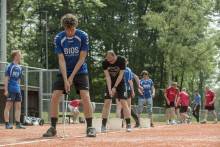It’s a noisy world nowadays online. In the Waaier building during the hustle and bustle of lunchtime, we randomly interviewed seven people about their use of social media sites and mobile phones to stay in touch with family and friends near and far away over the holiday break. Here’s what they had to add to the discussion on digital communications.
Blackberry ping, ping!
 ‘Hyves helps me integrate into Dutch culture,’ says Kelvin de Haseth Kleist who was born and raised on the island of Curaçao and sees some benefits to using social networks. Now he’s earning his master’s degree in Financial Engineering and Management and like most native Dutch his age, he connects on Hyves ― the only social network where he is an active member on a monthly basis. By and large, the 23-year-old conducts his daily conversations on his Blackberry phone through texting and pinging back and forth to other ‘Blackberry pals’. On his phone, he sends photographs for free to family members and to many of his close friends who reside in Asia. ‘Quite honestly,’ he says, ‘I couldn’t live without my Blackberry; it’s my way of life. I sometimes text my father when he’s in a board meetings,’ he says with a cheeky smile. All told, his mobile phone serves as an efficient and quick means of having fun with ‘instantaneous dialogue’ to people and circumvents any restrictions placed by governments that might not allow information to be openly shared and exchanged on social networks. Facebook has been banned in the People’s Republic of China, along with several other sites, which have been either blocked entirely or censored and edited for content. Fully integrated, Kelvin hasn’t booked tickets to go anywhere for the holidays, but instead, he plans to hang out to catch the local scene.
‘Hyves helps me integrate into Dutch culture,’ says Kelvin de Haseth Kleist who was born and raised on the island of Curaçao and sees some benefits to using social networks. Now he’s earning his master’s degree in Financial Engineering and Management and like most native Dutch his age, he connects on Hyves ― the only social network where he is an active member on a monthly basis. By and large, the 23-year-old conducts his daily conversations on his Blackberry phone through texting and pinging back and forth to other ‘Blackberry pals’. On his phone, he sends photographs for free to family members and to many of his close friends who reside in Asia. ‘Quite honestly,’ he says, ‘I couldn’t live without my Blackberry; it’s my way of life. I sometimes text my father when he’s in a board meetings,’ he says with a cheeky smile. All told, his mobile phone serves as an efficient and quick means of having fun with ‘instantaneous dialogue’ to people and circumvents any restrictions placed by governments that might not allow information to be openly shared and exchanged on social networks. Facebook has been banned in the People’s Republic of China, along with several other sites, which have been either blocked entirely or censored and edited for content. Fully integrated, Kelvin hasn’t booked tickets to go anywhere for the holidays, but instead, he plans to hang out to catch the local scene.
What’s QQ?

A researcher from the Nanjing Normal University, Xiaoyan Zhang, 32, studies in the area of Applied Mathematics, and is spending his PhD years flying back and forth from China to the Netherlands in a collaborative exchange program which allows him to earn credits towards his degree in both countries. In reality, Xiaoyan rarely finds spare time in his schedule to bother with social network sites, and he hasn’t registered as a member yet. He stays wired to home on his Nokia mobile phone and online through Skype. ‘I can’t say how often I call, but when I miss them, I pick up the phone,’ he reflects on his limited use of digital technology to keep in contact with people back home and locally. In China, he and friend Dongshuang explain that most people use an instant text messaging system called QQ which allows users to engage in private one-on-one chats using Chinese characters. Unlike many of his contemporaries, Xiaoyan plans to crack the books over the holiday break, affording him plenty of free time to read and delve into new topics.
Facebook: a social life?

Didem Akcay Perdahcidglu, 30, who hails from Ankara, Turkey, is a post doctoral researcher in the Applied Mechanics group, specializing in the area of generic linking of finite element based models. How does she stay in touch? With her long-distant friends, she connects occasionally using Skype and sends text messages on average three to four times a day. She owns a HTC mobile phone with a plan through Spartele.com, which she purchased because it allows her to call people abroad and talk to her parents in Turkey at a low rate. ‘My parents aren’t using computers much,’ she adds. The researcher says she finds ‘arbitrary surfing’ of the internet or investing large amounts of time in social networks isn’t worth the effort and often results in a less gratifying experience than getting out from behind the computer to socialize with people face- to- face. ‘It can be a major waste of valuable time. I feel it keeps you too preoccupied. I prefer social activities. It feels much more real.’
Internet café trend

Industrial Engineering and Management master’s student Mersha TeTemke Tsige, 23, mainly uses Facebook to stay in touch with family and friends back home. ‘Yes, most of the time I have contact like that. Ethiopians are very social people, so social networks like Facebook are a big hit in my country,’ says Mersha. On the other hand, Ethiopia is a poor country where ‘most people do not have a computer’. For this reason internet cafes are booming. Fortunately, many of his friends have university jobs and good access to computers. In addition to Facebook, Mesha uses Skype or says ‘hi’ through his regular Nokia mobile phone, using the economical Lebara mobile network to call home. Altogether Mersha estimates he is wired for about an hour a day, he finds moments between Facebooking to study hard or cook with friends his favorite food –Doro wotchicken.
Triple phone power

Electrical Engineering PhD student Pinar Santemiz often uses MSN to communicate with her family and friends in Turkey. Good old email also remains a favorite, particularly when she is unavailable to pick up the phone due to her courses or other activities. As a result, she may end up ‘typing for about three hours a day’ on weekdays. Although highly popular in Turkey, Pinar has decided not to Twitter and is critical of Facebook, saying, ‘Once you have an account, you can never get out.’ Weekends are the time for calling abroad, for which 29 -year-old Pinar is triple equipped to communicate. She owes a landline, a regular, ‘Lebara- powered’ mobile phone and an HTC smart phone. Though modern communication means can help to bridge distances she feels ‘it is never enough’ to connect. For her, face-to-face contact remains the best option. Fortunately, this is easy to realize with her Turkish friends in Enschede, where as she says, ‘it is so much more compact than in Istanbul’.
Just Voip…

Chinese PhD student Dongshuang Hou, who is currently completing a PhD in the area of Game Theory in the Faculty of Applied Mathematics, uses internet and email to stay in touch with especially his parents. He informs us that while there is no Facebook in China, QQ is highly popular as a chatting instrument. In addition, the 27-year old Dongshuang spends at least two hours weekly on the phone to call home. To ensure expenditures do not get out of hand, he uses 12voip, a Skype-like service, through which you can call landlines and on-line friends for free and mobile phones relatively cheap. In combination with making calls from his Nokia, he feels it is easy to stay in touch while enjoying his time in the Netherlands and- in the coming holidays –other parts of Europe.
Android to Istanbul

When urgent, Özlem Sardan Sukas simply picks up her Android mobile phone to call home, which can sometimes lead to rather high phone bills. In addition, she sometimes uses Skype in combination with a webcam to communicate to Turkey, but increasingly less due to ‘frequent connection problems’. Her landline serves as a substitute, as well as Facebook, which Özlem sometimes uses to keep track of her brother’s activities or to place informative links. All in all, Özlem considers modern communication a means not a viable alternative to face-to-face contact and staying connected certainly won’t hinder her and her husband from integrating and enjoying ‘real life’ in Enschede.
The 28-year-old micro-and nanotechnology post doctoral researcher is a careful and critical Facebook user. ‘I would rather get in touch through a private message than a public posting.’ Özlem is particularly ‘allergic’ to ‘nonsense’ updates of the ‘I’m here’ and, ‘hey, now I’m there’ types. She says, ‘When you are close to your friends then you will know where they are.’
Marloes van Amerom and Robbin Engels







